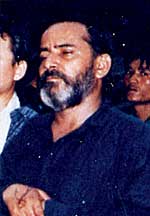 Excerpts from interview:
Excerpts from interview: "We have never said we will hold talks with the king only. What we meant was that it only makes sense to talk to the one who is in control of the army and the old regime. But one must remember that we have been holding direct and indirect talks with the major political parties, civil society and intellectual society also.
The king will either have to give up his control over the old regime and the army or we won't allow him to remain behind the curtain from where he has been pushing the country and the people to destruction.
In the absence of a reliable and acceptable-to-all mediation and an agreement on democratic system, we see no point sitting for talks with any one's representative. There is also no use of talks with the feudal government that is there to increase the budget of the royal palace and to bring black law for the royal army.
Both the king and Deuba of the old regime do not have people's base. As for us, our foundation on the people's level has been proved by the success of the people's war in the last nine years. The people's governments in all the rural areas of the country also prove our base.
That our demand for international mediation will result in foreign interference is a fallacious argument of the brokers of imperialists and expansionists. Without dealing with the present state of the civil war, the government's talks for elections is a part of the conspiracy to invite genocide. Since elections in status quo would be a part of the regression, we will destroy that conspiracy.
There have been arguments that the elections could pave way for an elected government with whom we could hold talks. But the first round of peace talks was held with an elected government of Sher Bahadur Deuba. Yet, the result only exposed that he had neither the capacity nor the authority. As long as the royal army remains loyal to the palace, elections and democracy in Nepal will only be showpieces.
Our demands for a round table conference among all political forces and civil society, the formation of an interim government through the meeting and the election for constituent assembly still remain. By the time elections for the constituent assembly are held, the arms of both the sides have to be stopped. After the elections and, in line with the results, the army and arms of both the sides will have to be managed. We can discuss
this in detail.
We are confident that the result of the elections of the constituent assembly will be in favour of the republican system. But we are committed to accept any result of such elections.
Our movement is nationwide today. In the rapid spread of such a revolutionary movement, it is natural that mistakes may have been committed in some places. The incidents in Dailekh are due to a combination of conspiracy by the old regime and the royal army and weaknesses of our own local cadre. But this does mean we have lost the people's sympathy. We have been trying to correct our mistakes and win their hearts and minds."


